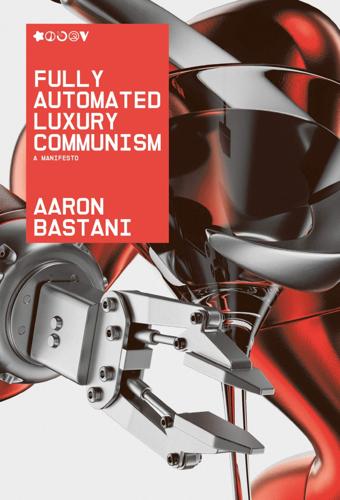
Fully Automated Luxury Communism
by
Aaron Bastani
Published 10 Jun 2019
Indeed, many no longer even considered them to be rules but rather reality itself, with alternative political systems viewed as either futile or incomprehensible. Here, liberal capitalism went from a contingent project to a reality principle. Welcome to the world of capitalist realism – where the map is the territory and nothing really matters. Capitalist Realism Capitalist realism is best summed up with a single sentence: ‘It is easier to imagine the end of the world than the end of capitalism.’* For Mark Fisher – the British theorist who coined the term – that catchphrase captures the very essence of our era, with capitalism not only viewed as the exclusively ‘viable political and economic system’ but also one where it is ‘impossible even to imagine a coherent alternative’.
…
And yet in a strange way, despite their markedly different forms of presentation, Obama and Trump shared a similar faith in the unique ability of markets to find solutions. After all, anything else is tantamount to heresy in a world of capitalist realism – where the end of the world is more plausible than the end of capitalism. This condition presents arguably the most pressing crisis of all: an absence of collective imagination. It is as if all humanity has been afflicted by a psychological complex, capitalist realism making us believe the present world is stronger than our capacity to remake it – as if it were not our ancestors who created what stands before us now. As if the very essence of humanity, if there is such a thing, is not to constantly build new worlds.
…
Capitalism, at least as we know it, is about to end. What matters is what comes next. The claim that capitalism will end, is, for capitalist realism, like saying a triangle doesn’t have three sides or that the law of gravity no longer applies while an apple falls from a tree. Rather than understanding the present as one historical period among many, like Victorian England or the Roman Republic, to be alive at the end of history means presuming our social systems to be as unchanging as the physical laws that govern the universe. And yet the truth is capitalist realism is already coming apart. The fact you are reading these words at all is proof.
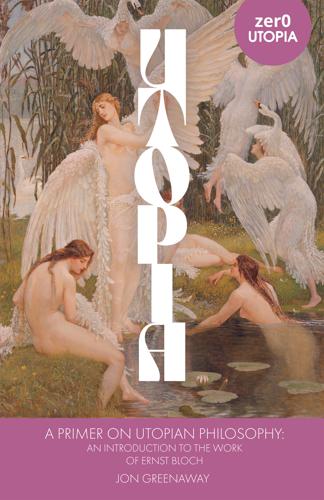
A Primer on Utopian Philosophy: An Introduction to the Work of Ernst Bloch
by
Jonathan Greenaway
Published 29 Mar 2024
‘Don’t mourn, organize’, says the classic leftist imperative, but for all the frenetic activity how far have we gotten? But, as Bloch pointed out himself, Genesis comes at the end, not the beginning. Perhaps here, even now, there is the possibility of recuperating the philosophy of hope, of looking at the world and seeing not the gray deterministic malevolence of capitalist realism but something struggling to come into a fullness of being. Not just new modes of life, but new knowledge too. For as Bloch put it, philosophy will have conscience of tomorrow, commitment to the future, knowledge of hope, or it will have no more knowledge. Ernst Bloch was born in the city of Ludwigshafen on July 8, 1885.
…
Bloch came to Utopian and Marxist politics in 1920s and 1930s Germany, in the midst of the rise of violent fascism. Thus, for the Utopian Bloch, his own politics had to respond to the material conditions and social totality of his own day. If any kind of Marxism faces challenges now, in the conditions of capitalist realism, then this is not a challenge of which Bloch himself was ignorant. As with his broader intellectual trajectory, perhaps it’s best to deal with Bloch’s own politics in stages. Firstly, his early work is a romantic and humanist rejection of what he saw as a stultifying historical materialism in Marxism.
…
We have in us what we could become. In a sense, we are pushed into the future through this dialectical tension and, on the collective level, the incompleteness and inexhaustible nature of our own shared history is both a resource and catalyst for a shared process of struggle. I think in the age of capitalist realism, Bloch’s injunction against pessimism might strike the reader as slightly odd, a willful denial of the facts. Yet, what interests me about the claim is the use of the word ‘right’. Pessimism is a choice. A choice for what, to do what? I think if we idealise the concept of pessimism, we think of it as a cold-hearted appraisal of just what is.
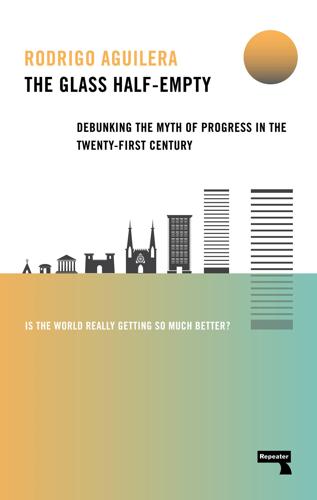
The Glass Half-Empty: Debunking the Myth of Progress in the Twenty-First Century
by
Rodrigo Aguilera
Published 10 Mar 2020
Cultural theorist Mark Fisher described our inability to think outside a liberal capitalist framework as “capitalist realism”, a play on the idealist art known as socialist realism which reflected how an economic ideology permeated every aspect of existence, including culture. Fisher also understood why capitalism has done so well at resisting alternative narratives: If capitalist realism is so seamless, and if current forms of resistance are so hopeless and impotent, where can an effective challenge come from? A moral critique of capitalism, emphasizing the ways in which it leads to suffering, only reinforces capitalist realism. Poverty, famine and war can be presented as an inevitable part of reality, while the hope that these forms of suffering could be eliminated easily painted as naive utopianism.
…
Fisher ends Capitalism Realism not with nihilism but with anticipation of what was yet to come: The long, dark night of the end of history has to be grasped as an enormous opportunity. The very oppressive pervasiveness of capitalist realism means that even glimmers of alternative political and economic possibilities can have a disproportionately great effect. The tiniest event can tear a hole in the grey curtain of reaction which has marked the horizons of possibility under capitalist realism. From a situation in which nothing can happen, suddenly anything is possible again.27 One positive development is that certain dogmas of progress are now thoroughly discredited.
…
Poverty, famine and war can be presented as an inevitable part of reality, while the hope that these forms of suffering could be eliminated easily painted as naive utopianism. Capitalist realism can only be threatened if it is shown to be in some way inconsistent or untenable; if, that is to say, capitalism’s ostensible “realism” turns out to be nothing of the sort.2 The starting point of any new economic framework should be to reform its main economic institution: the firm. Just as democracy distributed power to disenfranchised citizens, whatever economic model succeeds capitalism must be capable of distributing wealth just as effectively to disenfranchised workers.
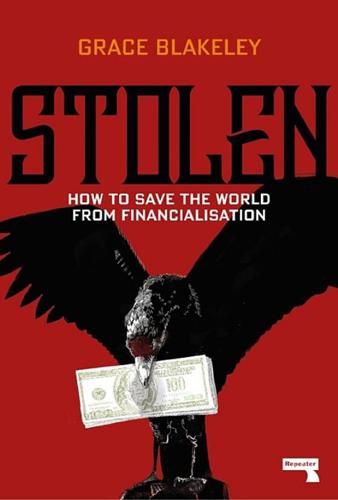
Stolen: How to Save the World From Financialisation
by
Grace Blakeley
Published 9 Sep 2019
The owners of capital became unimaginably wealthy on the back of this broken system, but when it collapsed under the weight of its own excesses, it was ordinary working people who were forced to bear the costs. The death of capitalist realism has led to the rebirth of ideology, and of history. The political upheaval of the last decade is a response to the re-emergence of fundamental questions about what kind of society we want to live in. Politics is no longer a question of making technocratic tweaks to a stable system; it is once again a great battle of ideas and the movements that champion them. But with the death of capitalist realism, the greatest challenge faced by contemporary capitalist societies is no longer imagining a different kind of future, it is getting from here to there.
…
Beyond all this, perhaps the most important role of a British democratic socialist government would be to provide the rest of the world with a beacon of hope. A socialist government in one of the most heavily financialised states in the global economy would seriously undermine international financial capital, concentrated as it is in the City of London — but it would also rally socialists all over the planet. After decades of capitalist realism, it would be possible to imagine a world based on cooperation rather than competition, on mutual aid rather than exploitation, and on stewardship of our common resources rather than ruthless extraction. CONCLUSION There is no final victory, as there is no final defeat. There is just the same battle.
…
History was over. Capitalism had won. Globalisation — constructed as a neutral, inevitable process — would bring the benefits of the free market to the more backwards parts of the world if they would only let it in. The planet was suffering from an acute collective depression that Mark Fisher termed “capitalist realism”: it would have been easier for most people to imagine the end of the world than the end of capitalism. Seven years later, those same people could have been forgiven for thinking that they were living through both. The financial crisis of 2008 rocked the global economy to its core, exposing the economists’ dreams of taming the economic cycle as pure fantasy.
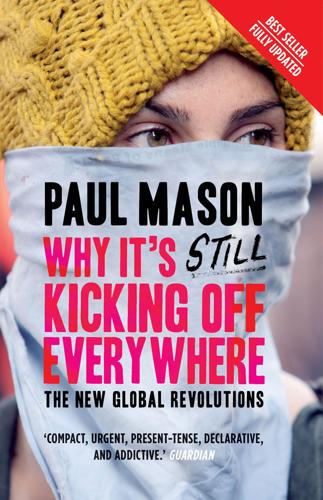
Why It's Still Kicking Off Everywhere: The New Global Revolutions
by
Paul Mason
Published 30 Sep 2013
Walt, ‘Why the Tunisian revolution won’t spread’, ForeignPolicy.com, 16 January 2011. 3.Reuters, 25 January 2011, 18:25 GMT. 4.Jonathan Lis, ‘New IDF intelligence chief failed to predict Egypt uprising’, Haaretz, 30 January 2011. 5.Edward Said, ‘Islam through Western eyes’, Nation, 26 April 1980. 6.Tarek Masoud, ‘The road to (and from) Liberation Square’, Journal of Democracy, vol. 22, no. 3, July 2011. 7.Fredric Jameson, ‘Future City’, New Left Review 21, May—June 2003. 8.Fredric Jameson, The Cultural Turn: Selected Writings on the Postmodern, 1983-1998, London 1998, p. 59. 9.N. Chomsky and E. Herman, ‘Preface to the 2002 Edition’, Manufacturing Consent: The Political Economy of the Mass Media, London 2002, p. xii. 10.Quoted in Mark Fisher, Capitalist Realism: Is There No Alternative?, Ropley 2009. 11.Fisher, Capitalist Realism, pp. 3–16. 12.Ron Suskind, ‘Faith, certainty and the presidency of George W. Bush’, New York Times Magazine, 17 October 2004. 13.Anthony Giddens, ‘My chat with the colonel’, Guardian, 9 March 2007. 14.Paul Mason, Meltdown: The End of the Age of Greed, London 2010, p. 233. 15.Quoted in Y.
…
Indifference to class, the one-dimensional mindset of the professional ‘Arabists’ and outright self-interest all played a part in misleading the political right. But the left, too, was disoriented. The key problem was spelled out by the theorist Fredric Jameson in 2003: ‘It is easier to imagine the end of the world than it is to imagine the end of capitalism.’7 Twenty years of capitalist realism When a cheetah catches a gazelle there is always a moment where the prey gives up: it goes floppy, bares its neck, becomes resigned to its fate. You have got me, it seems to say, but now you have to kill me; in the meantime I will try to think about something else. This has been the relationship between the right and the left since the early 1990s.
…
This is no longer the external control of Orwell’s 1984, but a pre-programmed alternative reality against which the hero cannot deploy core human values like love and decency. In an influential essay, cultural commentator Mark Fisher describes the impact of all this on a generation that has known nothing else. He calls the resulting phenomenon ‘capitalist realism’, defined as the widespread sense that not only is capitalism the only viable political and economic system, but also that it is now impossible even to imagine a coherent alternative to it … a pervasive atmosphere conditioning not only the production of culture but also the regulation of work and education, and acting as a kind of invisible barrier constraining action.11 Up to 2008, the left’s inability to imagine any alternative to capitalism was like a mirror image of the right’s triumphalism.
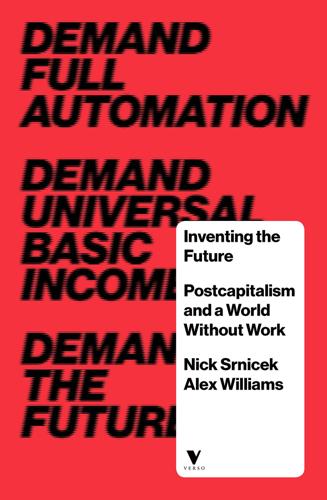
Inventing the Future: Postcapitalism and a World Without Work
by
Nick Srnicek
and
Alex Williams
Published 1 Oct 2015
For a lengthy critique of Laclau and Mouffe’s discourse-based hegemony theory, see Geoff Boucher, The Charmed Circle of Ideology: A Critique of Laclau and Mouffe, Butler and Žižek (Melbourne: re.press, 2009). 14.David Harvey, A Brief History of Neoliberalism (Oxford: Oxford University Press, 2005), p. 40. 15.This concept was originally devised by Joseph Overton, in relation to the proper operational purpose of a think tank. See Nathan J. Russell, ‘An Introduction to the Overton Window of Political Possibilities’, Mackinac Center for Public Policy, 4 January 2006, at mackinac.org. 16.This can be conceived in cultural terms as the creation of ‘capitalist realism’. See Mark Fisher, Capitalist Realism: Is There No Alternative? (Winchester: Zero, 2009). 17.‘In such a situation, hegemony has nothing to do with the capacity to make people believe in you; it has everything to do with the strategic capacity to render their belief or disbelief irrelevant.’ Jeremy Gilbert, ‘Hegemony Now’, 2013, at academia.edu, p. 16. 18.David Harvey, Spaces of Hope (Berkeley, CA: University of California Press, 2000), p. 159. 19.Judy Wajcman, TechnoFeminism (Cambridge: Polity, 2004), p. 35. 20.Jonathan Joseph, Hegemony: A Realist Analysis (New York: Routledge, 2002). 21.Thomas Hughes, ‘Technological Momentum’, in Merritt Roe Smith and Leo Marx, eds, Does Technology Drive History?
…
Fuelled by a widespread belief that the new industrial capitalism was temporary and that a better world would soon emerge, workers militantly struggled for this new world. In a climate far more hostile than our own, labour was able to create an array of strong organisations and exert significant pressure.31 The successes of this time were inseparable from a broader utopian culture. By contrast, today’s world remains firmly confined within the parameters of capitalist realism.32 The future has been cancelled. We are more prone to believing that ecological collapse is imminent, increased militarisation inevitable, and rising inequality unstoppable. Contemporary science fiction is dominated by a dystopian mindset, more intent on charting the decline of the world than the possibilities for a better one.33 Utopias, when they are proposed, have to be rigorously justified in instrumental terms, rather than allowed to exist in excess of any calculation.
…
But this argument neglects alternative ways in which that crisis could have been resolved and attributes immense clarity of self-interest to capitalists. 53.Philip Cerny, Rethinking World Politics: A Theory of Transnational Neopluralism (New York: Oxford University Press, 2010), p. 139. 54.David Stuckler, Lawrence King and Martin McKee, ‘Mass Privatisation and the Post-Communist Mortality Crisis: A Cross-National Analysis’, Lancet 373: 9,661 (2009). 55.Harvey, Brief History of Neoliberalism, p. 41. 56.This is one source of the common claim that postmodernism is the cultural expression of neoliberalism. 57.Harvey, Brief History of Neoliberalism, p. 53. 58.Dardot and Laval, New Way of the World, p. 3. 59.Ibid., p. 265. 60.Mark Fisher, Capitalist Realism: Is There No Alternative? (Winchester: Zero, 2009), Chapter 4. 61.Wanda Vrasti, ‘Struggling with Precarity: From More and Better Jobs to Less and Lesser Work’, Disorder of Things, 12 October 2013, at thedisorderofthings.com. 62.Harvey, Brief History of Neoliberalism, p. 61. 63.For evidence of the austerity narrative and its adoption in popular consciousness, see Liam Stanley, ‘“We’re Reaping What We Sowed”: Everyday Crisis Narratives and Acquiescence to the Age of Austerity’, New Political Economy 19: 6 (2014). 64.Ernesto Laclau, ‘Identity and Hegemony: The Role of Universality in the Constitution of Political Logics’, in Judith Butler, Ernesto Laclau and Slavoj Žižek, eds, Contingency, Hegemony and Universality: Contemporary Dialogues on the Left (London: Verso, 2011), p. 50. 65.The classical mark of ideology today is that it feeds on cynicism, or, as Slavoj Žižek puts it, ideology works even (and especially) if you do not believe in it.
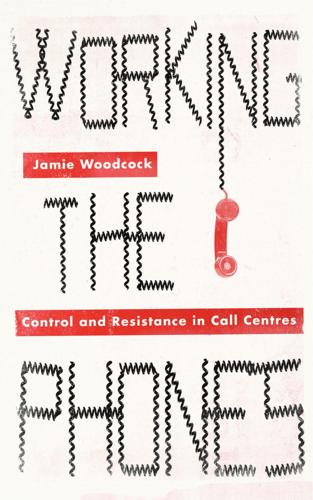
Working the Phones: Control and Resistance in Call Centres
by
Jamie Woodcock
Published 20 Nov 2016
The Wolf of Wall Street (2014). 8. Ibid. 9. Ibid. 10. Hilary Osborne, ‘Call Centres in BBC3 Programme Hit with £225,000 Fines’, The Guardian, 18 June 2013, www.theguardian. com/money/2013/jun/18/call-centres-bbc3-programme-fines 11. Mark Fisher, Capitalist Realism (Winchester: Zero Books, 2009), p. 63. 12. Ibid. 13. Franz Kafka, The Castle (London: Penguin, 2000), p. 65. 14. Fisher, Capitalist Realism (2009), p. 65. 15. Ibid., p. 64. 16. Enda Brophy, ‘The Subterranean Stream: Communicative Capitalism and Call Centre Labour’, Ephemera, Vol. 10, No. 3/4 (2010), p. 471. 17. The Call Centre (2013). 18. Phil Taylor and Peter Bain, ‘“An Assembly Line in the Head”: Work and Employee Relations in the Call Centre’, Industrial Relations Journal, Vol. 30, No. 2 (1999), p. 109. 19.
…
Angela Tinwell, Mark Grimshaw, Debbie Abdel Nabi and Andrew Williams, ‘Facial Expression of Emotion and Perception of the Uncanny Valley in Virtual Characters’, Computers in Human Behaviour, Vol. 27, No. 2 (2010), p. 741. 63. Office Space [Film] Twentieth Century Fox, 1999. 64. Ibid. 65. Ibid. 66. Fisher, Capitalist Realism (2009), p. 40. 67. Marx, Capital ([1867] 1976), pp. 279–80. 68. Richard Edwards, Contested Terrain: The Transformation of the Workplace in the Twentieth Century (New York: Basic Books, 1979), p. 12. 174 Notes 69. Ibid. 70. Ibid., p. 18. 71. Paul Thompson, The Nature of Work: An Introduction to Debates on the Labour Process (London: Macmillan, 1989), p. 123. 72.
…
Faulkner, K., Bentley, P. and Osborne, L. (2015) ‘Shame of the Charity Cold Call Sharks’, Daily Mail, 7 July, available at: www.dailymail.co.uk/news/ article-3151533/Shamed-charity-cold-call-sharks-Britain-s-biggestcharities-ruthlessly-hound-vulnerable-cash-try-opt-receiving-calls. html Fernie, S. and Metcalf, D. (1997) (Not) Hanging on the Telephone: Payment Systems in the New Sweatshops, Centre for Economic Performance: London School of Economics. Fischer, C. S. (1992) America Calling: A Social History of the Telephone to 1940, Berkeley: University of California Press. Fisher, M. (2009) Capitalist Realism: Is There No Alternative?, Winchester: Zero Books. Foucault, M. (1991) Discipline and Punish: The Birth of the Prison, London: Penguin. Fredman, S. (2003) ‘Women at Work: The Broken Promise of Flexicurity’, Industrial Law Journal, Vol. 33, No. 4, pp. 219–399. Friedman, A. L. (1977) Industry and Labour: Class Struggle at Work and Monopoly Capitalism, London: Macmillan.
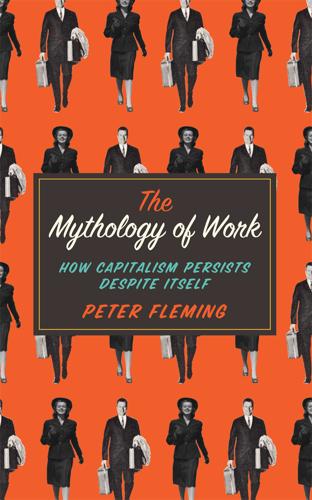
Mythology of Work: How Capitalism Persists Despite Itself
by
Peter Fleming
Published 14 Jun 2015
Phil Connor’s new-found communist ethic of social love, learning and laughing is our only hope too for breaking the life sentence of late-capitalist employment relations. Fundamentally, it consists of a critique of everyday life through radical remembrance. Phil knew exactly what was coming. However, is it really possible to break the spell of capitalist realism with some sort of inspired social love? Learning From the Falling Banker Let us delve a little further into this strange Groundhog-Day-like impasse that has lured so many into the closed universe of work today. As is often the case, we can learn some axiomatic principles about the late capitalist mindset by examining its fullest embodiment.
…
It simply pulls off the sham in a different way. The use of truth in this manner is quite different to the regimes of truth that Foucault (1977) once announced were decisive in modern Western society. This has nothing to do with philosophical relativism. Indeed, while Bruno Latour is sadly not much of a critic of capitalist realism, he was fairly accurate a few years back when he argued that relativism has been successfully co-opted by the pundits of neoliberalism to serve their own agenda (see Latour, 2004). Postmodernism as an era and intellectual movement is thankfully over. But so is modernity. Many social divisions and sources of authority exude a regressive pre-modern flavour that many of us find utterly stifling and archaic (even in the technologically advanced metropolises of late-capitalism … perhaps especially here).
…
Once again critical admission mutates into a pro-capitalist stance and begins to serve an ‘I, Job’ function that is experienced as more inescapable than before. By facing the appalling truth these individuals paradoxically become more astute and willing investment bankers. Again we witness a rather schizophrenic and demented feature of capitalist realism today. Because its revelatory contradictions are no longer hidden but expressed, the grit that dialectical analysis relies upon to force the synthesis is circumvented or even dissolved. This post-dialectical expression of power immunizes both patent falsehoods and plain-speaking corporate truthfulness from true radical criticism.
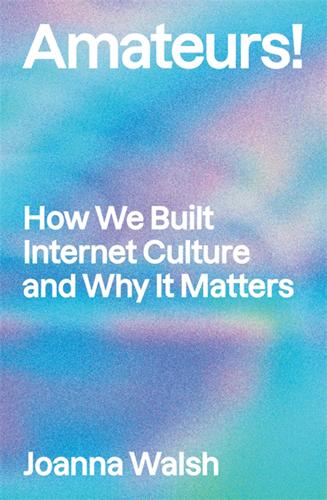
Amateurs!: How We Built Internet Culture and Why It Matters
by
Joanna Walsh
Published 22 Sep 2025
Giorgio Agamben has a different perspective: to record is to destroy. But to destroy is to remake: ‘Precisely because he makes alienation from the past into a value, the figure of the collector is in some way related to that of the revolutionary, for whom the new can appear only through the destruction of the old.’21 Mark Fisher, in his 2009 Capitalist Realism: Is There No Alternative?, deplores the cultural decontextualisation of the curated gallery or museum but sees no hopeful alternatives online. Meanwhile, novelty for the amateur curator on Tumblr, Instagram or Pinterest exists neither in the context of hegemonic histories, nor in their decontextualisation, but in pure and random accumulation: the artist as shopper.
…
Mark Fisher described capitalism as a ‘ “system of equivalence” which can assign all cultural objects, whether they are religious iconography, pornography, or Das Kapital, a monetary value’. Capitalism’s decontextualisation of everything, its ‘conversion of practices and rituals into merely aesthetic objects’, led Fisher to speculate: ‘Capitalist realism is therefore not a particular type of realism; it is more like realism in itself.’5 If capitalism is like realism, then it is mimetic of a certain style of art. It is aesthetic. How does this play out in the cost-and-consequence-free reproduction of objects in the cod-Vermeer, overcluttered interior created via the intensely capitalised DALL·E?
…
Fisher and Brian Flota, The Politics of Post-9/11 Music (Routledge, 2011), p. 4. 21.Fredric Jameson, Postmodernism, or the Cultural Logic of Late Capitalism (Duke University Press, 1991), p. 74. 22.Agamben, The Man Without Content, p. 107. 23.Jameson, Postmodernism, p. 74. 24.Sianne Ngai, Ugly Feelings (Harvard University Press, 2005), p. 324. 25.Nick Land, The Dark Enlightenment (Imperium, 2022). 2023: The SunDALL·E Painters of the Internet 1.@CitizenPinup, Twitter, 21 October 2023; @soncharm, Twitter, 20 October 2023; @RedWingsPhoenix, Twitter, 22 October 2023; Jacques Rancière, Aesthesis: Scenes from the Aesthetic Regime of Art, trans. Zakir Paul (Verso, 2019), p. 3. 2.Ibid., p. 4. 3.Mark Fisher, Capitalist Realism: Is There No Alternative? (Zero Books, 2009), p. 4. 4.Deleuze, Difference and Repetition, p. 275. 5.Christopher D. Manning, Prabhakar Raghavan and Hinrich Schütze, Introduction to Information Retrieval (Cambridge University Press. 2008), p. 22. 6.Rancière, Aesthesis, p. 4. 7.Andrew Liszewski, ‘Neural Networks Upscale Film from 1896 to 4K, Make It Look Like It Was Shot on a Modern Smartphone’, gizmodo.com, 4 February 2020. 8.
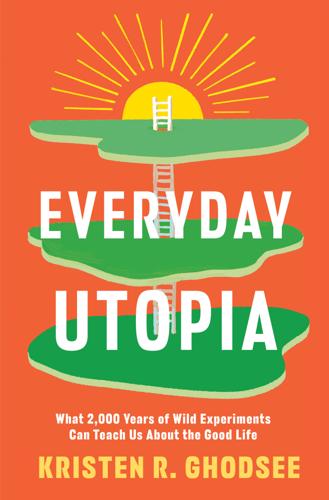
Everyday Utopia: What 2,000 Years of Wild Experiments Can Teach Us About the Good Life
by
Kristen R. Ghodsee
Published 16 May 2023
By forcing us to look back rather than forward, by privileging memory over hope, the ubiquity of dystopian thinking browbeats us into accepting the status quo. In this final chapter, I want to think through the value of utopianism as a project of “militant optimism,” and to challenge the “capitalist realism,” to borrow a term from the late cultural theorist Mark Fisher, that has permeated mainstream Western culture for much of the last century. Capitalist realism refers to a particular cultural mindset that convinces us that there are no workable alternatives to the way things are today. It finds its most powerful expression in the ubiquity of dystopian films, books, and television shows that bombard us with the message that any deviation from our current way of doing things will inevitably make us worse off.
…
Slate, August 14, 2014, https://www.slate.com/culture/2014/08/the-giver-banned-why-do-so-many-parents-try-to-remove-lois-lowrys-book-from-schools.html. 27 “Top 100 Chapter Book Poll Results,” School Library Journal, July 7, 2012, https://www.web.archive.org/web/20120713031015/http://blog.schoollibraryjournal.com/afuse8production/2012/07/07/top-100-chapter-book-poll-results/. 28 Sheila O’Malley, “The Giver,” Roger Ebert, August 15, 2014, https://www.rogerebert.com/reviews/the-giver-2014. 29 Mark Fisher, Capitalist Realism: Is There No Alternative? (Chicago: Zero Books, 2009), 33. 30 Mitchell Kalpakgian, “The Ideological Attack on the Family in Orwell’s 1984 and Huxley’s Brave New World,” Faith & Reason: The Journal of Christendom College 26, no. 4 (Winter 2001): https://www.media.christendom.edu/wp-content/uploads/2016/09/Mitchell-Kalpakgian-An-Ideologial-Attack-on-the-Family.pdf. 31 Jeane J.
…
abortion, 94, 95, 152, 213 Abundance (Diamandis), 14 academia, academic studies, 37, 69–70 blue sky thinking and, 16 farming taught alongside, 121–22, 126–27 gender pay gap in, 20–21 valued above manual labor, 118, 121 Acts 2, 142, 154 Acts 4, 142 adoption, 221, 222–23, 224 Agriculture Department, US, 71 Albigensians, 142, 143 alloparents, alloparenting, 30, 181, 221, 222, 229 among nonhuman primates, 182–83 nuclear-family households as deterrent to, 185, 218, 226–27 state-funded, 213 All the Single Ladies (Traister), 197 Amazon, Indigenous tribes of, 186 Amazon (company), 67 Amazons (Greek mythology), 2, 26, 233 American Revolution, 144 Amish America website, 154 Anabaptists, 144, 153–54, 254 anarchists, anarchism, 8, 150–52 private property and, 140, 145 see also Kropotkin, Peter; Proudhon, Pierre-Joseph Anarchy, State, and Utopia (Nozick), 149 Ancient Society (Morgan), 152 Andover Theological Seminary, 80 Animal Farm (Orwell), 243–44 Anna Karenina (Tolstoy), 201 Another Community, 162 Apartment List website, 51 Apologia per Galileo (Apology for Galileo) (Campanella), 7 Appel d’une femme au peuple sur l’affranchissement de la femme (Appeal of a Woman to the People on the Enfranchisement of Women) (Démar), 208–9 Apple, Think Different slogan of, 15 Aristophanes, 11, 204 Arnold, Brother, 154–55 Arthur, Chester, 192 artificial intelligence (AI), 14 artificial life, 16 Asexual Visibility and Education Network (AVEN), 224 Association for Library Service to Children, Newbery Medal of, 244 Atarashiki-mura community, 162 Athens, ancient: monogamy in, 189, 202 Peloponnesian War defeat of, 4, 76 property owners in, 139–40 wealth inheritance in, 188–89 see also Greece, ancient BabyCenter website, 18 Babyjahr (baby year), 95 Baden-Württemberg, Campus Galli in, 36–37 banks, 57, 147–48 Bastani, Aaron, 14 Baugruppen (building groups), 56–57, 62 Bebel, August, 91, 210, 211, 246 nuclear family rejected by, 211–12 as proponent of gay rights, 211, 216 Social Democratic Party founded by, 210 women as viewed by, 210–11 Becker, Gary S., 188 Beguines, beguinages, 32, 38–39 castigated as heretics, 39, 254 modern, 57 women’s autonomy in, 38 Belgrade, University of, 47 Benedictine monasteries, 35, 36 Benedict of Nursia, Saint, 35 Berlin, cohousing projects in, 56 Berlin Senate Department for Urban Development, 57 Bernard, George W., 36 Bernard, Zoë, 50 Bertelsmann Foundation, 73 besprizornye, bezprizorniki (unattended ones), 114–15 Betzig, Laura, 190 Bezos, Jeff, 67 Bible, 143 see also New Testament; Old Testament Bible communism, 141–42, 153–57, 166 bihon lifestyle, 216 birth control, 152, 186, 215 birth rates, decline of, 75, 152, 216, 236 BirthStrike, BirthStrikers, 25, 257 Bjerre, Britta, 54–55 Blair, Eric (George Orwell), 243–44 Bloch, Ernst, 238 militant optimism and, 234–35, 240 Blount, Elizabeth, 190 blue sky thinking, 15–17, 24, 108, 239 see also dreamers, dreaming; hope, hopefulness; imagination bofællesskab (Danish communal housing projects), 53–57 Bogdanov, Alexander, 9 Bogomils, Bogomil sect, 142–44, 253 celibacy practiced by, 142, 205, 258 women’s equality in, 142, 154 Bolsheviks, 46, 93–94, 179 Boo, Katherine, 177–78 Book of the City of Ladies, The (Pizan), 38 Boomers, home ownership among, 51 Bowles, Samuel, 105 Boyd, Hal, 178 Boyd, Robert, 195 Boym, Svetlana, 47 Braff, Danielle, 220 Brancolini, Fabio, 129 Braun, Lily, 91–92 Brave New World (Huxley), 241–44, 245, 250 Bregman, Rutger, 14, 260 British Palestine, kibbutzim in, 86 Brooks, David, 177–78 Bruderhof colonies, 156–57 Brunswick, Maine, Two Echo Cohousing in, 52–53, 53 Bucur, Maria, 216 Buddha, 35, 167 Buddhists, Buddhism, 35, 141, 162 celibacy practiced by, 204, 258 Bulgaria: public education in, 118–19 “Unity in Diversity” project in, 130 see also Bogomils, Bogomil sect Bulgarian Women’s Committee, 96 Bureau of Labor Statistics, US, 106 Burkart, Judith M., 180–81 Burkina Faso, polygamy in, 187 California, three-parent adoption in, 224 California, University of: at Davis, 180 at Santa Cruz, 29, 200 Callenbach, Ernest, 9, 12 Cambridge University Center for Climate Repair, 16 Campanella, Tommaso, 6–7, 7, 112–13, 130, 132 Campus Galli, 36–37 Canada: Hutterite communities in, 154 patrilineal naming conventions imposed on Indigenous peoples in, 19–20 Canadian Cohousing Network, 66 Canterbury College, 37 capitalist realism, 240 capitalists, capitalism, 167, 214, 246 condition of women’s lives under, 10 early industrial, 8–10 hereditary transfer of wealth in, 29–30, 33–34, 144–49, 168, 188–90, 207–8 nuclear family structure and, 247–49 private property and, 145 public schools and, 105–8 wealth accumulation as prime concern of, 141, 145–46, 167 Carolingian monasteries, 36–37 Çatalhöyük, 32–33, 34 Cathars: Catholic Church and, 143, 253–54, 258 celibacy practiced by, 205, 253–54 women considered equals by, 142–44, 154 Catherine of Aragon, 190 Catholic Inquisition, 13 Catholics, Catholic Church, 4, 37 Albigensian Crusade of, 143 Beguines castigated as heretics by, 39, 254 Cathars despised by, 143, 253–54, 258 celibacy practiced by priests and nuns in, 205, 258 divorce prohibited by, 190 godparents and, 222 Hutterites persecuted by, 154 monogamy enforced by, 190, 218 tithes collected by, 143 vast land holdings of, 143 celibates, celibacy, 205, 219 of Bogomils, 142, 205 of Cathars, 205, 253–54 as challenge to monogamy, 204–5 in monastic communities, 32, 35, 205 of Shakers, 154–55, 205 cenobites, cenobitic monasticism, 35–36, 38–39, 141 celibacy practiced by, 32, 35, 205 property held in common by, 35, 141 Centers for Disease Control, 74, 176 “Century of Women,” 216 Ceresco (Wisconsin Phalanx), 42 Chana, Ziona, thirty-nine wives and ninety-four children of, 187 Chernyshevsky, Nikolai, 8 childcare, 21, 262 as commodity vs. public good, 100 nonparental, 74 state-supported, 10, 72–73, 92–95, 96–101 universal, 75, 79, 99, 237 worldwide disparity in access to, 96 childcare, communal, 43, 75, 76, 80, 101, 163, 178, 228 benefit to mothers of, 21, 88, 91, 98 benefit to parents of, 10, 21, 75–76, 90 developmental benefit to children of, 86, 90–91, 97–99, 237 on kibbutzim, 87–88, 89–90 childcare, in nuclear families, 73–74, 100, 256 Covid-19 pandemic and, 218, 257 by unpaid mothers, 10, 20–21, 25, 31, 56, 59, 68, 73, 77, 94, 128, 160 child labor, 79 child-rearing, 14, 25, 177–78, 180, 217–18 alloparenting in, see alloparents, alloparenting disparity in access to, 96 multi-parenting in, 223–26 platonic parenting in, 223 as public service, 76 public support for, 10, 72 women’s careers in conflict with, 21, 70–75 child-rearing, collective, 17, 24, 221, 237, 258 alloparenting in, see alloparents, alloparenting children’s long-term development benefited by, 90–91, 97–99 in cohousing, 52–53, 60 as essential for women’s incorporation in the labor force, 91 in Godin’s Familistery, 43 in kibbutzim, 86–91 Kollontai’s vision for, 92–95 Marx and Engels on, 79–80 in Oneida community, 81–85, 95 state-supported, 93–95 child-rearing, in nuclear families: diminishing multigenerational support in, 74, 177 financial cost of, 71–76 by unpaid mothers, 10, 20–21, 25, 31, 56, 59, 73–74, 78, 94 children: carbon footprint of, 228 collective rearing as beneficial to, 86, 90–91, 97–99, 237 with DNA of three parents, 223 early developmental needs of, 74 early immunity as beneficial to, 98 fathers’ surnames taken by, 18 as historically owned and controlled by men, 22, 137, 249 in polyamorous families, 224–25 as public goods, 76 “Children Should Have One Hundred Parents” (Graae), 54 chimpanzees, 180, 182–83 China, 49, 162 alloparental relationships in, 222 polygyny outlawed in, 190 Chomsky, Noam, 250 Christians, Christianity, 167 “Bible communism” and, 141–42, 153–57 communal sects of, 35–36, 153–57 godparents and, 222 monastic tradition in, see monastics, monasticism nuclear family and, 218–19 “Perfectionism” doctrine of, 80, 87 Churchill, Winston, 86 Church of England, 190 Church of Jesus Christ of Latter-day Saints (Mormons), plural marriage practiced among, 191–92 Cigna US Loneliness Index, 31 Cistercians, 35 Cities of Ladies (Simons), 38 Città del Sole, La (The City of the Sun) (Campanella), 6, 112–13 civil rights movement, US, 9 Cleveland, Grover, 192–93 climate crisis, 13, 127, 257 Coalition for Radical Life Extension, 16 cohousing, 52–57, 59, 65–66, 250–51 all-female, 57–58 architecture and design of, 59–60 children raised in, 52–53, 60; see also child-rearing, collective conflict resolution in, 64 conflicts in, 63–67 division of housework in, 59–60, 167 economic advantages of, 59, 61–62, 67 environmental benefits of, 62, 67, 167 loneliness and isolation mitigated in, 63, 67 for seniors, 57–58, 71 Cohousing Association of America (CohoUS), 66 Cold War, 3, 9, 86, 123, 231 Coldwell, Will, 50 Colgate University, 47 co-living, 49–52, 250–51 colleges and universities: communal living at, 29, 66 as historically male spaces, 38 Colombia: civil war in, 58 matriarchal ecovillage in, 57–58 Common (company), 50 communal living, 17, 25, 136 co-living, 49–52, 250–51 on college campuses, 29 economic advantages of, 31, 59, 61–62, 67 environmental advantages of, 31, 32 shared responsibilities in, 32 social connections in, 31 see also cohousing; kibbutzniks, kibbutzim “commune,” as pejorative term, 161 #communelife, 251 communism, communists, 8, 145, 150–51 anarchism vs., 151–52 1898 collapse of, 235 “Communist Confession of Faith” (Engels), 79 Communist Manifesto, The (Marx and Engels), 79–80, 107, 167, 209, 245–46 communities, 14, 17, 32, 37, 74 agricultural, 153 intentional, see intentional communities Community Playthings, 157 compadres (co-parents), 222 compersion, 221 Condition of the Working Class in England, The (Engels), 79 Congress, US, 123, 158–59, 192 Conly, Sarah, 77 Connelly, Rachel, 99 Conquest of Bread, The (Kropotkin), 9 Constitution, US, 2 contraception, 152, 186, 215 convents, 32, 38–39 Cooper, Davina, 237, 240–41 cooperation, 24, 68, 100, 105, 112, 114, 126–27, 202, 207 competition valued above, 121–22, 126 in conflict resolution, 64 as innate human tendency, 9 as learned trait, 65 Copenhagen, University of, Royal Academy of Art and Architecture at, 58 Copernicus, 6 Corinthians, First Epistle to, 205 corporations, blue sky thinking and, 15–16 Council of Vienne (1311), 39 COVID-19 pandemic, 13, 67, 128, 155 homeownership and, 51 isolation and loneliness exacerbated by, 31, 218 parents of young children and, 257 rise of domestic violence during, 175–76, 195 Cowden, Jonathan, 194 crime: income inequality and, 196 violent, 175–76, 195–96 see also domestic violence Cristina (Ghodsee’s grandmother), 171–72, 173, 175, 225 Cutas, Daniela, 223–24, 225 Cybele (fertility goddess), 204 Dakota people, 191 Dalai Lama, 141 Davis, Wade, 15 Dawn of Everything, The (Graeber and Wengrow), 235 Dead Sea Scrolls, 141 debt, financial, 30–31, 106–7, 129, 147–48, 256 Defense Department, US, “death gratuity” of, 76 De Leon, Daniel, 212, 215, 246 Démar, Claire, 208–9 Denmark, cohousing in, 53–54, 60 De revolutionibus orbium coelestium libri vi (Six Books Concerning the Revolutions of the Heavenly Orbs) (Copernicus), 6 Diamandis, Peter, 14 “Dictatorships & Double Standards” (Kirkpatrick), 247–48 Dishotsky, Jon, 50 Dispossessed, The (Le Guin), 9 divine right of kings, 7, 144 divorce, 160, 215, 222–23, 236, 250, 262 in ancient Athens, 188–89 no-fault, 24 in France, 18, 208–9 prohibited in Bible, 190 in Soviet Union, 94–95, 213, 215 domestic relations, see private lives, private sphere domestic violence, 173–76, 195 hidden in single-family homes, 176 rise in, during pandemic, 175–76, 195 US levels of, 176 Dominican order, 35–36 domus (nuclear family), 34 dreamers, dreaming, 11–12, 26, 255, 262 see also blue sky thinking; imagination Duolingo, 129 Durango, Colo., cohousing in, 60 Durrett, Charles, 58 dwelling, see communal living; homes, single-family; housing Dyson, Freeman, 23 dystopia, dystopian fiction, 124–25, 231 capitalist realism mindset in, 240 change as portrayed in, 245–47, 249–54 destruction of traditional family as portrayed in, 241–45 fear deployed in, 26, 240–47, 250, 260–61 taught to children, 244–45, 262 in US high school curricula, 241, 243, 262 as warning against totalitarianism, 243 Dzerzhinsky Commune, 117 Eastern Europe: collapse of socialism in, 64, 196 state-funded childcare in, 95–96 East Germany: state-supported childcare in, 99–100 state-supported maternity leave in, 95–96 economic inequality, 179, 188, 195 homicide rates and, 196 nuclear family and, 196–97 Ecotopia (Callenbach), 9, 12 Ecovilla Gaia, 160 ecovillages 57–58, 160–61, 163, 168, 221, 252, 254, 259 ectogenesis, 25 Edinburgh, University of, 120 Edmunds Anti-Polygamy Act (US; 1882), 192, 193 education: adult, 129–33, 259 higher, see higher education public, see public education Education for Self-Reliance (Nyerere), 121 Education with Production (EWP), 122 edX courses, 129 Einstein, Albert, 27–28, 109 elder care, public support for, 10 Emile (Rousseau), 108 Encyclopaedia Britannica, 149 Enfantin, Barthélemy Prosper, 207–8, 209, 254 Engels, Friedrich, 78–80, 91, 151, 209, 212, 245–46, 251, 253 as advocate for universal child-care and education, 79, 85 as advocate for women’s rights, 152–53 Familistery criticized by, 45 Fourier’s influence on, 40, 251 England: same-sex marriage in, 216 see also United Kingdom Enquiry Concerning Political Justice and Its Influence on Morals and Happiness (Godwin), 146, 206–7 environmental utopias, 9 Epistle of James, 35 Equal Rights Amendment, 2 Essenes, 141, 253 Europe, see Eastern Europe; Western Europe Expatriation Act (US; 1907), 19 Fair Housing Act, US, 65 Families First Coronavirus Response Act (US; 2020), 220 Familistery, 42–46, 45, 47, 253 family, non-traditional, 14 blended, 222 chosen, 218–23 polyamorous, 224–25 redefining and expanding of, 25, 180, 226–29 family, nuclear, 54, 169, 175–80, 197–98, 219, 226, 246 as adapted to protect the wealthy, 196–97, 249 capitalist defenders of, 247–49 dystopian fears of destruction of, 241–45 governments’ vested interest in upholding, 255–56 monogamy in, 219, 255 myth of inevitability of, 186, 236 parenting in, see childcare, in nuclear families; child-rearing, in nuclear families persistent ideal of, 177–78, 193, 201–2, 217, 236 see also homes, single-family; marriage, traditional; monogamy, monogamous societies family abolitionism, 217 famulus (servant or slave), 34 fear: of being alone and unloved, 240–41 of change, 15, 236–37, 250, 260 dystopian, 26, 240–47, 250, 260–61 of failure, 239 hope vs., 240 of non-monogamy, 194 of violence, 201 weaponized to benefit status quo, 16–17, 241 fearmongering, 250, 260 by organized religious denominations, 247 FedCon Star Trek convention, 234 Federal Employees Family Friendly Leave Act (US; 1994), 220 femininity, stereotypes about, 25 feminism, word coined by Fourier, 40 feminists, cohousing promoted by, 54, 67 Fern, Jessica, 178 fertility rates, decline in, 73, 227 Festival Filosofia (Festival of Philosophy), 129–30, 130 feudalism, 7 financial crisis (2008), 51, 162 Finkel, Eli, 25 Firestone, Shulamith, 217, 241 First Amendment, 192 1st Indigenous Ecovillage, 160 Fisher, Mark, 240, 246 FitzRoy, Henry, 190 501(d) organizations, 158–60 Folbre, Nancy, 76 Fortunato, Laura, 189 Foundation for Intentional Community, 66 Fourier, Charles, 14, 24, 253 Engels and Marx influenced by, 40, 251 passionate attraction theory of, 8 secular phalanstery envisioned by, 40–42, 41 France, 188 Albigensians in 142, 143 Cathars in, see Cathars divorce outlawed in, 208 state-supported childcare in, 97, 100 utopian socialists in, 10 Franciscans, 35–36 freecycling, 164, 168 free-market societies, 150, 247 see also capitalists, capitalism free rider problem, 11 free stores, 168 French Civil Code, 208 French Revolution, 7–8, 40, 144–45, 146, 208 Friedman, Milton, 106–7 Fully Automated Luxury Communism (Bastani), 14 future, 12, 76, 132–33, 234–38, 258 commitment to, 26 dystopian visions of, see dystopia, dystopian fiction fear and, 152, 241, 260 hope and, 238–39, 260 imagining, 14, 253, 260 militant optimism and, 26, 234–38, 240, 258, 262 positive vision of, 27–28, 233, 260 as unknowable and uncertain, 250, 256 utopian visions of, see utopia, utopian ideas Galeano, Eduardo, 238 Galileo Galilei, 6–7 Gandhi, Mohandas K.
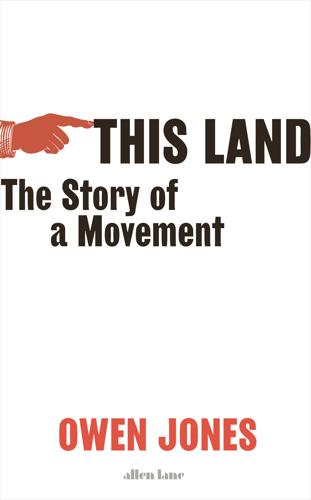
This Land: The Struggle for the Left
by
Owen Jones
Published 23 Sep 2020
In these dark moments, it was only this faint hope that sustained the left: where neoliberals, convinced of the permanence of their triumph, talked of the end of history, the left clung to the idea that history had a habit of coming back. But, in the early 1990s, it didn’t look likely any time soon. A new consensus had been forged, one defined by the late cultural theorist Mark Fisher as ‘capitalist realism’, or ‘the widespread sense that not only is capitalism the only viable political and economic system, but also that it is now impossible even to imagine a coherent alternative to it’.6 Len McCluskey, a thick-set Scouser whose rectangular spectacles give him the air of an intellectual bouncer, is the most influential trade union leader of modern times.
…
A more fragmented working-class has meant less of a sense of collective identity – or of a class with a common purpose, which could pool its strength to extract concessions from bosses. This in turn fuelled a feeling that class politics no longer served a practical purpose for many people: it was out of date, the relic of a bygone age, pointless. This belief would prove a fundamental pillar of capitalist realism – and few clung to it more fiercely than New Labour, the party remoulded in the image of its leader, Tony Blair. When Blair became leader in 1994, the Labour left had been more or less extinguished, along with the politics it espoused. The Blairites ‘wanted Year Zero: they wanted to change the party for ever’, says former Tribune editor Mark Seddon.
…
Their protests centred on global institutions – the World Bank, the International Monetary Fund and the World Trade Organization – which they accused of fostering policies of privatization and deregulation, of favouring the interests of capital over labour, of forcing poorer markets open to multinational corporations at the expense of domestic industries, and of destroying the environment – making the lives of billions immeasurably poorer in the process. Their placards and banners summed it up: ‘Our Resistance Is As Global As Their Capital’; ‘Say No To The WTO’; and most enduringly – in a defiant, desperately hopeful rejection of capitalist realism – ‘Another World Is Possible’. These movements were diffuse and disconnected and, without the ability to build a coherent alternative to the established order, their moment soon passed. Nonetheless, they revealed a deep well of discontent with the established order, and new radical voices – Naomi Klein’s No Logo, a cri de coeur against modern consumer capitalism, became the defining book of a generation – found a mass audience.
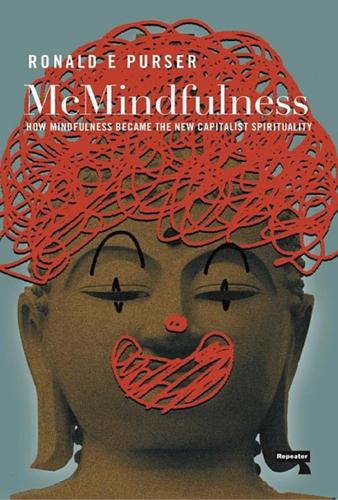
McMindfulness: How Mindfulness Became the New Capitalist Spirituality
by
Ronald Purser
Published 8 Jul 2019
Mindfulness needs to be embedded in the organic histories and local knowledge of communities, empowering them to see how things are. When we recognize that disaffection, anxiety and stress are not just our own fault, but are connected to structural causes, this becomes fuel for igniting resistance. As Mark Fisher writes in Capitalist Realism, “Affective disorders are form of captured discontent; this disaffection can and must be channeled outward, directed towards its real cause, Capital.”30 The liberation of mindfulness depends on building solidarity out of the ruins of McMindfulness, assisting victims of exploitation to resist the inhuman demands of capitalism.
…
Beacon Press, 2018. p.59. 27 Mary Watkins and Helene Shulman, Toward Psychologies of Liberation. Palgrave, 2008. p.29 28 Robert Hattam, Awakening Struggle: Towards a Buddhist Critical Theory. University of South Australia Press, 2002. p.228 29 Erich Fromm, Beyond The Chains of Illusion, Abacus, 1989. pp.131-132 30 Mark Fisher, Capitalist Realism. Zero Books, 2009. p.80 31 http://nomosjournal.org/2013/08/searching-for-integrity/ 32 https://tricycle.org/trikedaily/conscientious-compassion/ 33 Peter Gabel, The Desire for Mutual Recognition: Social Movements and the Dissolution of the False Self. Routledge, 2018. p.210 34 https://vimeo.com/ondemand/themindfulrevolution Acknowledgements I would like to give special thanks to my publisher, Tariq Goddard, who took an immediate interest in my book and has been a champion of promoting it.
…
The landscape of twenty-first-century arts and letters is faded and inert, riven by fashionable cynicism, egotistical self-reference and a nostalgia for the recent past. Repeater intends to add its voice to those movements that wish to enter history and assert control over its currents, gathering together scattered and isolated voices with those who have already called for an escape from Capitalist Realism. Our desire is to publish in every sphere and genre, combining vigorous dissent and a pragmatic willingness to succeed where messianic abstraction and quiescent co-option have stalled: abstention is not an option: we are alive and we don’t agree. Published by Repeater Books An imprint of Watkins Media Ltd Unit 11Shepperton House 89-93 Shepperton Road London N1 3DF United Kingdom www.repeaterbooks.com A Repeater Books paperback original 2019 1 Distributed in the United States by Random House, Inc., New York.
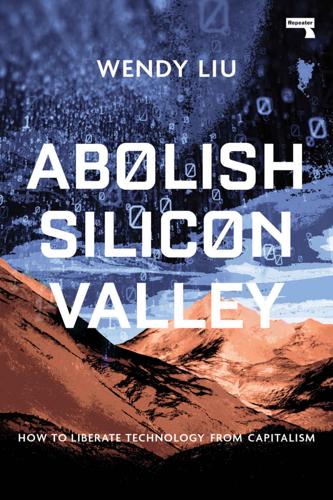
Abolish Silicon Valley: How to Liberate Technology From Capitalism
by
Wendy Liu
Published 22 Mar 2020
Instead, we should rewire the lines of power within the industry, as well as society at large; the goal should be democratic control over technology’s development, and an equitable distribution of its benefits. From today’s vantage point, in our barren landscape of creeping privatisation and billionaires amidst bone-chilling poverty, the idea of democratic control over technology seems almost unbearably far away. A murky fog of capitalist realism pervades, and the suffocating logic of commodification feels totalising, eternal. And yet even in the darkness of our dystopia there are glimmers of hope — glimpses of the world as it could be. Even in the heart of Silicon Valley itself, people are rejecting the status quo and organising to build power using whatever leverage they can find.
…
Chen for Jacobin, https://jacobinmag.com/2019/01/stem-coding-bootcamp-education-scam-philanthropy, and “Tech’s Push To Teach Coding Isn’t About Kids’ Success – It’s About Cutting Wages” by Ben Tarnoff for the Guardian, https://www.theguardian.com/technology/2017/sep/21/coding-education-teaching-silicon-valley-wages. 11 I’ve posted a summary of this endeavour on my blog, at https://dellsystem.me/posts/a-year-of-200-books. Some of my favourites included Mark Fisher’s Capitalist Realism: Is There No Alternative? (Zero Books, 2009) and Geoff Mann’s Disassembly Required: A Field Guide to Actually Existing Capitalism (AK Press, 2013). 12 Harvard University Press, 2004. 13 Published by Notes From Below on January 29, 2018, at https://notesfrombelow.org/article/silicon-inquiry. 14 The workers, all US-based, later filed a complaint with the National Labor Relations Board for unfair dismissal, which would turn out successful.
…
The landscape of twenty-first-century arts and letters is faded and inert, riven by fashionable cynicism, egotistical self-reference and a nostalgia for the recent past. Repeater intends to add its voice to those movements that wish to enter history and assert control over its currents, gathering together scattered and isolated voices with those who have already called for an escape from Capitalist Realism. Our desire is to publish in every sphere and genre, combining vigorous dissent and a pragmatic willingness to succeed where messianic abstraction and quiescent co-option have stalled: abstention is not an option: we are alive and we don't agree.
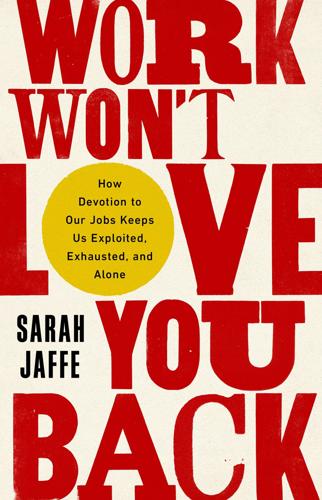
Work Won't Love You Back: How Devotion to Our Jobs Keeps Us Exploited, Exhausted, and Alone
by
Sarah Jaffe
Published 26 Jan 2021
“Economics are the method: the object is to change the soul,” Thatcher said. 16 Thatcher is most famous, perhaps, for her declaration that “there is no alternative.” She meant it as a preference—communism was still kicking at the time, and social democracy still had a grip on much of Europe. But TINA was the foundation of the phenomenon the British theorist Mark Fisher called “capitalist realism”—the idea that it is impossible to imagine any other way that the world could be organized. Neoliberalism relies on such realism, even when—or perhaps especially when—it is faltering. 17 In the United States, Federal Reserve chair Paul Volcker’s “shock” in 1980, limiting the money supply and hiking interest rates, put tens of thousands of companies out of business.
…
The flood of new, desperate workers into the low-wage labor market—often, once again, into jobs mirroring the work they were expected to do in the home—helped to hold wages down for all while improving profits for those at the top. 59 In the decades following welfare reform, labor in the paid workplace has been made cheaper because certain work remains unwaged and in the home. In Kathi Weeks’s words, neoliberalism’s “romance of the capitalist market” as the site of freedom “is coupled with a revived romance of the privatized family as the necessary locus of social reproduction and a haven in a heartless world.” The collapse of communism and the triumph of capitalist realism has led to diminished imaginings, too, of how domestic work could be done differently. Instead, in the age of the “two-earner family,” we hear a lot about “work-life balance,” but not enough about how, for everyone, “life” (code for “family”) often means “unpaid work.” 60 And only some people even get to consider such balance.
…
Moreover, Gilmore noted, progressive funders, in particular, want their money to go to programs rather than to core operations. The right, meanwhile, she wrote, spends freely on ideas. As a result, people like Ashley Brink work long, grueling schedules to make up for the work that should be done by a much larger workforce. 35 Indeed, in the era of capitalist realism, charity itself became a business model. Perhaps the most famous example of this was Project (RED), U2 singer Bono’s branded clothing and tchotchke line that raised money for AIDS research. (RED), Bono and his colleagues insisted, was not a charity but “hard commerce,” a thing the pop star incredibly likened to “punk rock.”
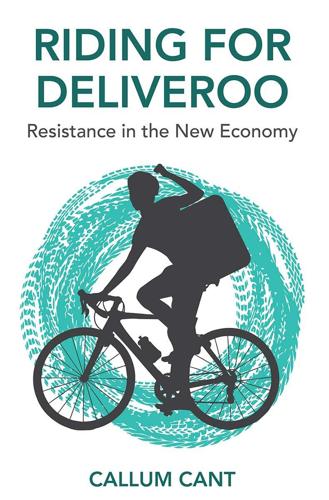
Riding for Deliveroo: Resistance in the New Economy
by
Callum Cant
Published 11 Nov 2019
But it was saved at the expense of ordinary people. As a result of that assault, the political status quo went out the window. The comfy ride of ruling-class domination turned into a rollercoaster. Between 2010 and 2015, protests, strikes, social movements, and revolutions swept the world. What the cultural theorist Mark Fisher called ‘capitalist realism’ – the assumption that capitalism is the only way of organizing human social life – began to fall apart.13 The technical and social composition of the working class had changed, and the political composition was transformed as a result. Now, finally, the morbid symptoms of a collapsing consensus are obvious.
…
Notes from Below. www.notesfrombelow.org/article/workers-inquiry-and-social-composition; S. Wright (2002) Storming heaven: class composition and struggle in Italian Autonomous Marxism. Pluto Press. 11. F. Fukuyama (2012) The end of history and the last man. Penguin Books. 12. M. Roberts (2016) The long depression. Haymarket Books. 13. M. Fisher (2009) Capitalist realism: is there no alternative? Zero Books. 14. N. Srnicek (2017) Platform capitalism. Polity. 15. J. Woodcock and M. Graham (2019) The gig economy: a critical introduction to platform work. Polity. 16. Some estimates claim that 2.8 million people worked in the gig economy at some point in 2017.
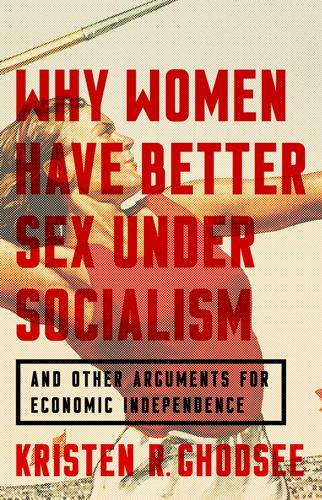
Why Women Have Better Sex Under Socialism: And Other Arguments for Economic Independence
by
Kristen R. Ghodsee
Published 20 Nov 2018
New York: Common Notions, 2012. Fidelis, Malgorzata. Women, Communism, and Industrialization in Postwar Poland. New York: Cambridge University Press, 2010. Firestone, Shulamith. The Dialectics of Sex: The Case for Feminist Revolution. New York: Farrar, Straus and Giroux, 2003. Fisher, Mark. Capitalist Realism: Is There No Alternative? Ropley, Hampshire, UK: Zero Books, 2009. Fitzpatrick, Sheila. Everyday Stalinism: Ordinary Life in Extraordinary Times: Soviet Russia in the 1930s. New York: Oxford University Press, 2001. Fraser, Nancy. Fortunes of Feminism: From State-Managed Capitalism to Neoliberal Crisis.
…
The follow-up study using the 1992–1994 data and the 2006 data is Daniel Carlson, Amanda Miller, Sharon Sassler, and Sarah Hanson, “The Gendered Division of Housework and Couples’ Sexual Relationships: A Re-Examination,” Journal of Marriage and Family 78, no. 4 (2016): 975–995. 22. The longitudinal study of German couples is M. D. Johnson, N. L. Galambos, and J. R. Anderson, “Skip the Dishes? Not So Fast! Sex and Housework Revisited,” Journal of Family Psychology 30, no. 2 (2016): 203–213. 23. Mark Fisher, Capitalist Realism: Is There No Alternative? (Ropley, Hampshire, UK: Zero Books, 2009). 24. On emotional labor, see Arlie Russell Hochschild, The Managed Heart: Commercialization of Human Feeling (Berkeley: University of California Press, 2012). 25. Elizabeth O’Brien, “People Are Stalling Their Divorce So They Don’t Lose Health Care,” Time, July 24, 2017, time.com/money/4871186/people-are-stalling-their-divorce-so-they-dont-lose-health-care. 26.

Marx at the Arcade: Consoles, Controllers, and Class Struggle
by
Jamie Woodcock
Published 17 Jun 2019
In the wake of neoliberalism, we are constantly told about the virtues of work—not only while we are doing it, but needing to constantly prepare and train for it too. Play appears to run against this. It is often viewed as wasted time that could be better spent developing our own “human capital” or some other bleak management-speak. However, despite this emphasis on productivity through “capitalist realism,”7 play is still viewed as important in the context of human development. Because play has a recognized role in childhood, it is often diminished, relegated to a developmental life phase, not as a serious activity. As Johan Huizinga argued, “Play is more than a mere physiological phenomenon or a psychological reflex…it is a significant function—that is to say, there is some sense to it….
…
,” Twitter, May 14, 2018. 2Quoted in Chris Kohler, “On ‘Videogame’ Versus ‘Video Game,’” Wired, November 12, 2007. 3“Game Definitions,” Molleindustria, http://www.gamedefinitions.com/#. 4Nicolas Esposito, “A Short and Simple Definition of What a Videogame Is,” Proceedings of DiGRA 2005 Conference: Changing Views – Worlds in Play, 2005; italics in the original. 5Jesper Juul, “Introduction to Game Time,” in First Person, eds. Noah Wardrip-Fruin and Pat Harrigan (Cambridge, MA: MIT Press, 2004), 140. 6Richard Rouse, Game Design (Sudbury, MA: Wordware Publishing, 2004), xx. 7Mark Fisher, Capitalist Realism: Is There No Alternative? (Winchester: Zero Books, 2009). 8Johan Huizinga, Homo Ludens: A Study of the Play-Element in Culture (Kettering, OH: Angelico Press, 2006), 1. 9Huizinga, Homo Ludens, 9. 10Notes from Below editors, “The Workers’ Inquiry and Social Composition,” Notes from Below, January 29, 2018, www.notesfrombelow.org/article/workers-inquiry-and-social-composition. 11Huizinga, Homo Ludens, 13. 12Katie Salen and Eric Zimmerman, Rules of Play: Game Design Fundamentals (Cambridge, MA: MIT Press, 2003), 94. 13Edward Castronova, Synthetic Worlds: The Business and Culture of Online Games (Chicago, IL: University of Chicago Press, 2005), 147. 14Salen and Zimmerman, Rules of Play, 95. 15Nick Dyer-Witheford and Greig de Peuter, Games of Empire: Global Capitalism and Video Games (Minneapolis and London: University of Minnesota Press, 2009), xxxiv. 16Roger Caillois, Man, Play and Games (Urbana and Chicago: University of Illinois Press, 2001), 5–6. 17Caillois, Man, Play and Games, 9–10. 18Caillois, Man, Play and Games, 12, 13. 19Lars Kristensen and Ulf Wilhelmsson, “Roger Caillois and Marxism: A Game Studies Perspective,” Games and Culture 12, no. 4 (2017): 388. 20Kristensen and Wilhelmsson, “Roger Caillois and Marxism,” 388. 21Kristensen and Wilhelmsson, “Roger Caillois and Marxism,” 393. 22Marshall McLuhan, Understanding Media: The Extensions of Man (London: Routledge, 2001), 258. 23McLuhan, Understanding Media, 259. 24“Video Game History Timeline,” National Museum of Play, www.museumofplay.org/about/icheg/video-game-history/timeline. 25Claude E.
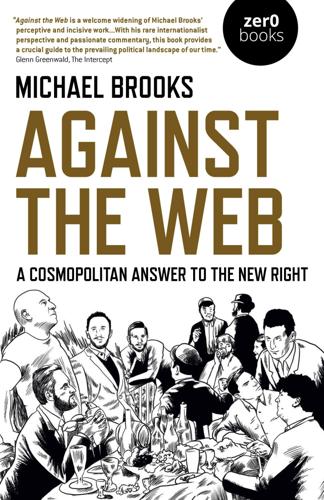
Against the Web: A Cosmopolitan Answer to the New Right
by
Michael Brooks
Published 23 Apr 2020
Paperback: 978-1-78535-699-5 ebook: 978-1-78535-700-8 In the Dust of This Planet Horror of Philosophy vol. 1 Eugene Thacker In the first of a series of three books on the Horror of Philosophy, In the Dust of This Planet offers the genre of horror as a way of thinking about the unthinkable. Paperback: 978-1-84694-676-9 ebook: 978-1-78099-010-1 The End of Oulipo? An Attempt to Exhaust a Movement Lauren Elkin, Veronica Esposito Paperback: 978-1-78099-655-4 ebook: 978-1-78099-656-1 Capitalist Realism Is There no Alternative? Mark Fisher An analysis of the ways in which capitalism has presented itself as the only realistic political-economic system. Paperback: 978-1-84694-317-1 ebook: 978-1-78099-734-6 Rebel Rebel Chris O’Leary David Bowie: every single song. Everything you want to know, everything you didn’t know.
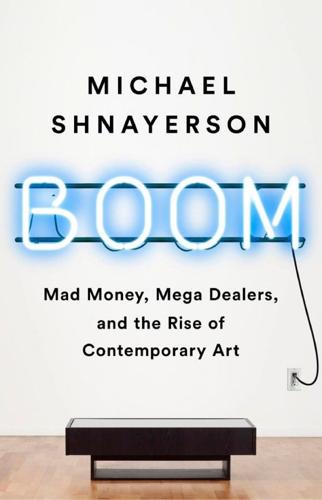
Boom: Mad Money, Mega Dealers, and the Rise of Contemporary Art
by
Michael Shnayerson
Published 20 May 2019
Joseph Beuys, Unschlitt/Tallow, 1977, stearin, tallow, chromel-alumel thermocouples with compensating cables, digital millivoltmeter, and alternating current transformer, 955 cm x 195 cm x 306 cm, Skulptur Projekte Archiv, www.skulptur-projekte-archiv.de/en-us/1977/projects/82/. 47. Andreja Velimirovic´, “Joseph Beuys,” Widewalls, November 3, 2016, www.widewalls.ch/artist/joseph-beuys/. 48. Capitalist Realism, Tate, www.tate.org.uk/art/art-terms/c/capitalist-realism. 49. Elizabeth Day, “Marian Goodman: Gallerist with the Golden Touch,” Guardian, October 11, 2014, www.theguardian.com/artanddesign/2014/oct/12/marian-goodman-gallerist-golden-touch. 50. “About,” Sperone Westwater, www.speronewestwater.com/gallery. 51. Schjeldahl, “Dealership.”
…
Georg Baselitz, who hung his double portraits upside down—a simple but radical and disquieting choice intended to draw attention to the painted surface—was another of the German artists who showed at d’Offay in London. So was Sigmar Polke, who did paintings of historical events. And so was Gerhard Richter. By the mid-1980s, Richter was one of Europe’s most celebrated artists, though no one could have predicted how high he would rise. Starting as a humble sign painter, he had appeared in a show called Capitalist Realism, a German send-up of Pop art, because “the artists associated with it were similarly interested in mass media and the banal.”48 Soon, he became known for putting print photographs onto canvas and painting over them to create his “blur” paintings, before exploring both landscapes and abstract work.
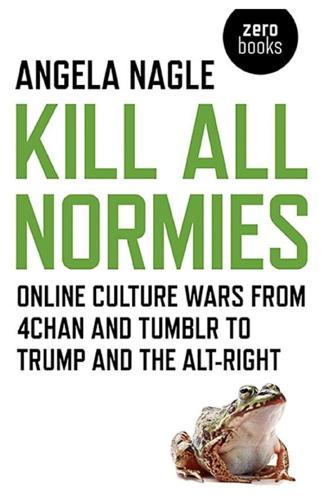
Kill All Normies: Online Culture Wars From 4Chan and Tumblr to Trump and the Alt-Right
by
Angela Nagle
Published 6 Jun 2017
Recent bestsellers from Zero Books are: In the Dust of This Planet Horror of Philosophy vol. 1 Eugene Thacker In the first of a series of three books on the Horror of Philosophy, In the Dust of This Planet offers the genre of horror as a way of thinking about the unthinkable. Paperback: 978-1-84694-676-9 ebook: 978-1-78099-010-1 Capitalist Realism Is there no alternative? Mark Fisher An analysis of the ways in which capitalism has presented itself as the only realistic political-economic system. Paperback: 978-1-84694-317-1 ebook: 978-1-78099-734-6 Rebel Rebel Chris O’Leary David Bowie: every single song. Everything you want to know, everything you didn’t know.
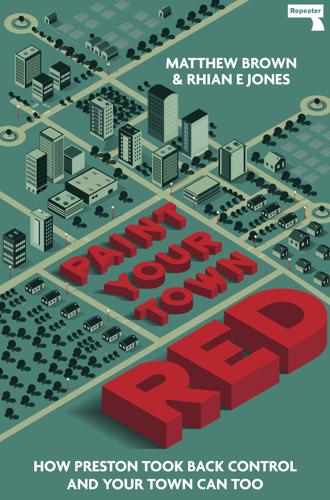
Paint Your Town Red
by
Matthew Brown
Published 14 Jun 2021
The landscape of twenty-first-century arts and letters is faded and inert, riven by fashionable cynicism, egotistical self-reference and a nostalgia for the recent past. Repeater intends to add its voice to those movements that wish to enter history and assert control over its currents, gathering together scattered and isolated voices with those who have already called for an escape from Capitalist Realism. Our desire is to publish in every sphere and genre, combining vigorous dissent and a pragmatic willingness to succeed where messianic abstraction and quiescent co-option have stalled: abstention is not an option: we are alive and we don’t agree
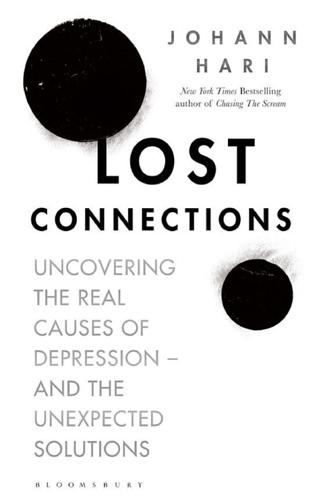
Lost Connections: Uncovering the Real Causes of Depression – and the Unexpected Solutions
by
Johann Hari
Published 1 Jan 2018
The Italian philosopher Paolo Virno says Ivor Southwood, Non-Stop Inertia (Arlesford, Hants: Zero Books, 2011), 15–6 (which, by the way, is a terrific book); Nick Srnicek and Alex Williams, Inventing the Future: Postcapitalism and a World Without Work (London: Verso, 2015), 93; Mark Fisher, Capitalist Realism: Is There No Alternative? (Winchester, UK: O Books, 2009), 32–37. Chapter 13: Causes Eight and Nine: The Real Role of Genes and Brain Changes Marc Lewis’s friends thought he was dead. Marc Lewis, Memoirs of an Addicted Brain: A Neuroscientist Examines His Former Life on Drugs (Toronto: Doubleday Canada, 2011), 139–42.
…
If you kept your hand on the stove, it would burn This image comes from Stephen Grosz’s wonderful book The Examined Life: How We Lose and Find Ourselves (London: Vintage, 2015). Depression and anxiety might, in one way, be the sanest reaction you have. Mark Fisher talks about this interestingly in his excellent book Capitalist Realism: Is There No Alternative? (Winchester, UK: O Books, 2009)—see pp. 18–20. You have to turn now to all the other wounded people around you, and find a way to connect with them This idea—that we need to come home—was influenced by Naomi Klein’s writing in This Changes Everything: Capitalism vs.
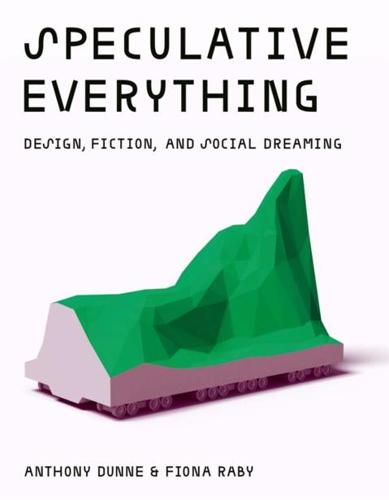
Speculative Everything: Design, Fiction, and Social Dreaming
by
Anthony Dunne
and
Fiona Raby
Published 22 Nov 2013
Design Act: Socially and Politically Engaged Design Tod ay-Critical Roles and Emerging Tactics. Berlin: laspis/ Sternberg, 2011. Feenberg, Andrew. Transforming Technology: A Critical Theory Revisited. Oxford: Oxford University Press, 2002 [1991]. Feenberg, Andrew. Questioning Technology. New York: Routledge, 1999. Fisher, Mark. Capitalist Realism: Is There No Alternative. Winchester: 0 Books, 2009. Flanagan, Mary. Critical Play: Radical Game Design. Cambridge, MA: MIT Press, 2009. Fogg, B.J.Persuasive Technology: Using Computers to Change What We Think and Do. San Francisco: Morgan Kaufmann, 2003. Fortin, David T.Architecture and Science - Fiction Film: Philip K.Dic k and the Spectacle of the Home.
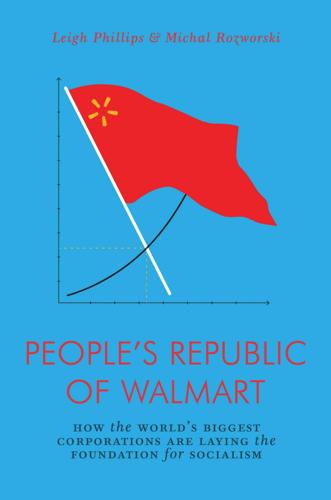
The People's Republic of Walmart: How the World's Biggest Corporations Are Laying the Foundation for Socialism
by
Leigh Phillips
and
Michal Rozworski
Published 5 Mar 2019
In the same way that neuroscientists have in recent decades stolen debates over the theory of mind away from philosophers, complexity theorists and computer scientists are stealing this debate away from economists and political scientists. However, the discussion still largely remains hidden within the realm of scientific journals—and even there, for many, it has become something of a mathematical parlor game. There is no active audience outside a tiny sprinkling of academics. Again, it’s capitalist realism: “Of course a nonmarket economy is absurd, Jim, but just as an exercise for my students …” Published just a bare two years after the 2008 financial crisis, Francis Spufford’s novel about economic planning, Red Plenty, prompted a burst of responses, particularly online. Perhaps the most interesting among them was a lengthy essay from self-decribed “vaguely lefty” Carnegie Mellon statistician Cosma Shalizi, who “learned linear programming at my father’s knee as a boy.”
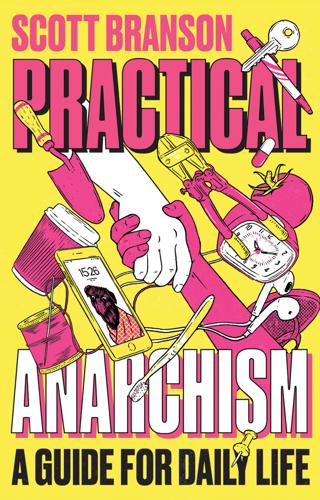
Practical Anarchism: A Guide for Daily Life
by
Scott. Branson
Published 14 Jun 2022
But we can apply this idea to consumption too, such that the objects we use and consume, tied as they are to these bloody histories and current violent practices, seem to come to us ready-made from nowhere—another utopian dream. Making Space Visible If invisibilization is a major method of maintaining capitalist “realism,” as Mark Fisher called it (making us believe in the inevitability and inescapability of capitalism), then perhaps a tactic when it comes to rethinking space is to make things visible: learning the history of the spaces we occupy, how they have come to be this way, who has lived here before, and what processes went on to remove some people and allow others to remain.
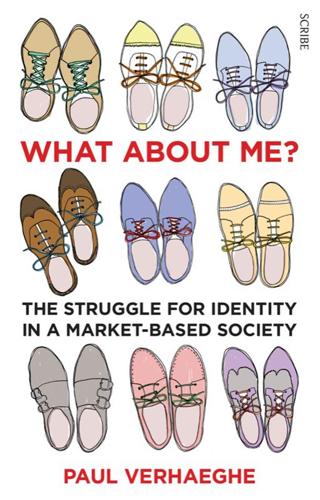
What About Me?: The Struggle for Identity in a Market-Based Society
by
Paul Verhaeghe
Published 26 Mar 2014
Psychologisation in Times of Globalisation. London: Routledge, 2012. de Waal, F. The Age of Empathy: nature’s lessons for a kinder society. New York: Harmony Books, 2009. Feynman, R. The Pleasure of Finding Things Out: the best short works of Richard P. Feynman. Cambridge, Massachusetts: Perseus Books, 2000. Fisher, M. Capitalist Realism: is there no alternative? Winchester, United Kingdom: Zero Books, 2009. Flyvbjerg, B. Making Social Science Matter: why social inquiry fails and how it can succeed again. Cambridge: Cambridge University Press, 2001. Foucault, M. Breekbare vrijheid: teksten & interviews. Amsterdam: Boom/Parrèsia, 2004. ——.
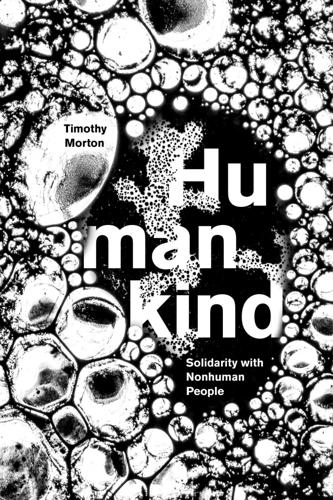
Humankind: Solidarity With Non-Human People
by
Timothy Morton
Published 14 Oct 2017
If a bee only behaves, and if a bee is a worker, a robot (from the Czech term for “worker”), then the bee is already as if alienated in a capitalist structure, one which doesn’t even need human input, but which spreads throughout the symbiotic real, reified as Nature: “the way things are,” which is to say, how they predictably behave. This is capitalist realism applied to nonhumans. It’s a bug, not a feature, of Marxism. The bee is permanently caught in the past, because if it only executes an algorithm, it’s executing some past state of the bee genome. So, not only is Nature mechanical and reified (no matter how squishy and green it looks), Nature is also frozen in the past.
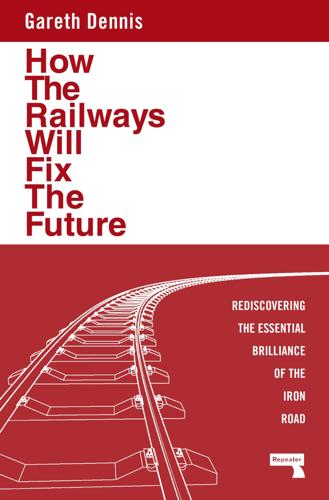
How the Railways Will Fix the Future: Rediscovering the Essential Brilliance of the Iron Road
by
Gareth Dennis
Published 12 Nov 2024
The landscape of twenty-first-century arts and letters is faded and inert, riven by fashionable cynicism, egotistical self-reference and a nostalgia for the recent past. Repeater intends to add its voice to those movements that wish to enter history and assert control over its currents, gathering together scattered and isolated voices with those who have already called for an escape from Capitalist Realism. Our desire is to publish in every sphere and genre, combining vigorous dissent and a pragmatic willingness to succeed where messianic abstraction and quiescent co-option have stalled: abstention is not an option: we are alive and we don’t agree.
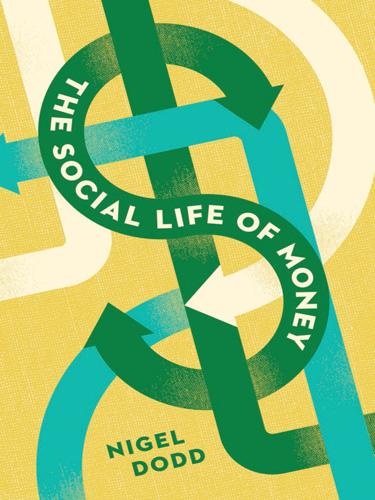
The Social Life of Money
by
Nigel Dodd
Published 14 May 2014
In the fractal stage of value that he describes, signs are arranged in haphazard and arbitrary fashion, and they mutate through contact. In Baudrillard’s terms, inflation does not make money less valuable and therefore less “real.” Rather, it makes money more real; that is to say, money is hyperreal. Couched in these terms, it is intriguing to consider Baudrillard’s argument in light of the notion of capitalist “realism” recently advanced by Mark Fisher. According to Fisher, neoliberalism produced a form of reality closure in which its major actors and institutions articulate a single version of capitalism’s reality and a definite, inexorable, vision of its future. There is, Fisher suggests, “a pervasive atmosphere, conditioning not only the production of culture but also the regulation of work and education, and acting as a kind of invisible barrier constraining thought and action” (Fisher 2009: 18).
…
Economy and Society 29 (3): 357–82. Finley, M. (1982). Economy and Society in Ancient Greece, London, Chatto and Windus. Fisher, I. (1933). “The Debt-Deflation Theory of Great Depressions.” Econometrica 1 (4): 337–57. Fisher, I., H. R. Cohrssen, et al. (1933). Stamp Scrip, New York, Adelphi Company. Fisher, M. (2009). Capitalist Realism: Is There No Alternative? London, Zero Books. Foster, W. and W. Catchings (1926). The Dilemma of Thrift, Newton, MA, Pollak Foundation for Economic Research. Foucault, M. (2005). The Order of Things, London, Routledge. Foucault, M. (2008a). The Birth of Biopolitics: Lectures at the Collège de France, 1978–1979, Basingstoke, U.K.: Palgrave Macmillan.
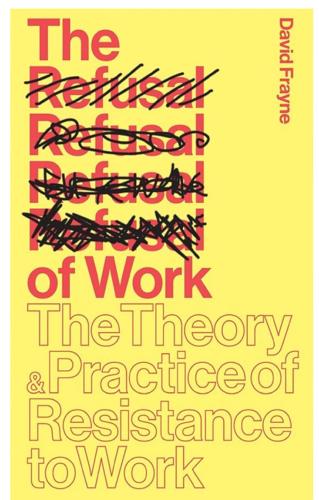
The Refusal of Work: The Theory and Practice of Resistance to Work
by
David Frayne
Published 15 Nov 2015
Fernie, S. and D. Metcalf (2000) ‘(Not) Hanging on the Telephone: Payment Systems in the New Sweatshops’, in D. Lewin and B. Kaufman (eds) Advances in Industrial and Labour Relations, Greenwich, CT: JAI Press. Fevre, R. (2003) The New Sociology of Economic Behaviour, London: SAGE. Fisher, M. (2009) Capitalist Realism: Is There No Alternative? Alresford: Zero Books. Fiske, J. (1989) Reading the Popular, London: Routledge. Fleming, P., B. Harley and G. Sewell (2004) ‘A Little Knowledge Is a Dangerous Thing: Getting Below the Surface of the Growth of “Knowledge Work” in Australia’, Work, Employment and Society, 18, 4, pp 725–747. http://dx.doi.org/10.1177/0950017004047951 Fleming, P. and A.
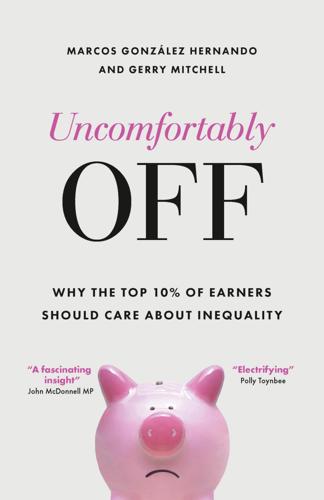
Uncomfortably Off: Why the Top 10% of Earners Should Care About Inequality
by
Marcos González Hernando
and
Gerry Mitchell
Published 23 May 2023
Federal budget 2022. 16 March. www.bundesregierung.de/breg-en/news/cabinet-federalbudget-2022-2016888 Financial Times (2014) Middle class ‘cling-ons’ squeezed out of London property market. www.ft.com/content/0664615a90dc-11e3-a2bd-00144feab7de Financial Times (2020) UK house prices show strongest start of year since 2005. www.ft.com/content/0d022c74-f506-45999acf-925761a43efe Financial Times (2021) Johnson to strip electoral watchdog of prosecution powers www.ft.com/content/aff47fb4-34ec-49c78aca-ebd462f4142b Financial Times (2022a) Gas and electricity networks top UK profit margin ratings. www.ft.com/content/aff47fb4-34ec-49c7-8acaebd462f4142b Financial Times (2022b) UK healthcare is already being privatised, but not in the way you think. www.ft.com/content/dbf166ce1ebb-4a67-980e-9860fd170ba2 Fisher, M. and Gilbert, J. (2013) Capitalist realism and neoliberal hegemony: A dialogue. New Formations, 80/81. Foa, R.S., Klassen, A., Slade, M., Rand, A. and Collins, R. (2020) Global satisfaction with democracy 2020. Cambridge: Centre for the Future of Democracy. 212 References Forbes (2022) What now for UK mortgage rates? Forbes Advisor www.forbes.com/uk/advisor/mortgages/mortgagerates-10-07-22 Forrest, A. (2022a) Government vows to clamp down on ‘fire and rehire’ after P&O sackings.
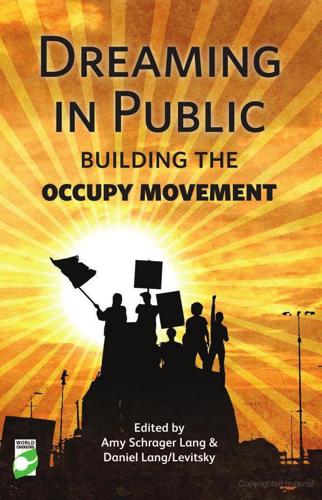
Dreaming in Public: Building the Occupy Movement
by
Amy Lang
and
Daniel Lang/levitsky
Published 11 Jun 2012
I admire those people, but I think the shameful problems of our larger society will capsize this movement if it attempts to solve them on its own, rather than channeling energy into changing a political structure that creates and ignores these human tragedies. Meanwhile, the more the camps attract troubled and violent people, the more they alienate the vast majority of the 99% the Occupy movement is trying to speak for, and leave those comfortable with violence and disorder in control.’3 The logic of capitalist realism is overwhelming here – in which the desire to include homeless people is ‘admirable’ but unrealistic – but what interests me in such rhetoric (and Walsh is pretty representative) is the explicit privileging of ‘the movement’ over the claims of those it seeks to speak for. Not only have the homeless and chronically unemployed suddenly ceased to be a part of ‘the vast majority of the 99%’, but she’s telling a revisionary history.
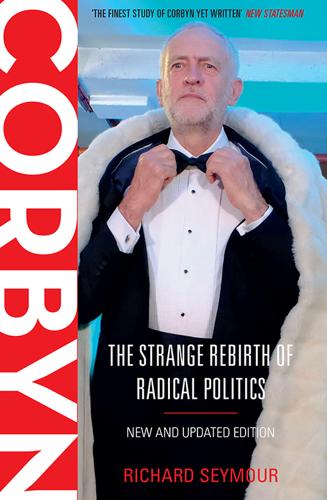
Corbyn
by
Richard Seymour
And in a normal political situation, Jeremy Corbyn shouldn’t be electable. The ‘common sense’ of the media and political class should prevail. Too bad for normality. Too bad for common sense. The credibility crunch has destroyed tons of political capital. At first, it seemed that normality, or what the late Mark Fisher called ‘Capitalist Realism’, would prevail. Corbyn was polling poorly, unable to expand Labour’s base beyond the approximately 30 per cent support that it had had since the 2015 election.29 He was confronting a centre-seeking Conservative Party, detoxified by the Liberals, and subtle enough to steal Labour’s ideas while trashing Labour: whether on the ‘living wage’ or claiming to represent workers.
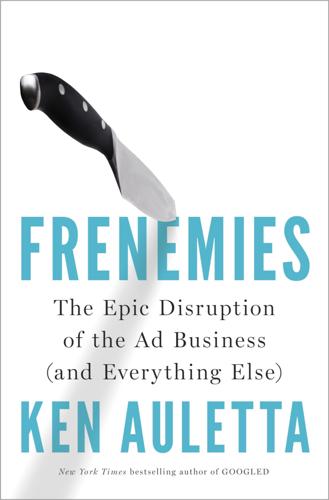
Frenemies: The Epic Disruption of the Ad Business
by
Ken Auletta
Published 4 Jun 2018
He was inspired to study the impact of advertising because “I did not have an adequate response” to students who asked why companies would spend so much on ads if they got little return. In the book he would write about the industry, Advertising, The Uneasy Persuasion,* Schudson explored advertising’s sins. He compared advertising to the art of socialist realism because “it does not claim to picture reality as it is but reality as it should be.” He labeled it “capitalist realism” and said ads are designed, whether successful or not, to “subordinate” messy reality in order to spike sales of a product. Among the hidden efforts of advertisers, critics most often latch on to how marketing manipulates our emotions. Industry leaders don’t deny this, they extol it. Jack Haber, who retired as CMO of Colgate in 2017, says, “I’m a believer that consumers make decisions emotionally.”
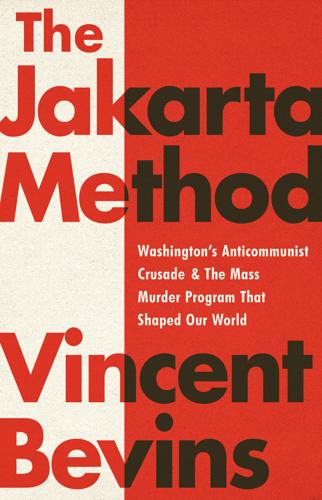
The Jakarta Method: Washington's Anticommunist Crusade and the Mass Murder Program That Shaped Our World
by
Vincent Bevins
Published 18 May 2020
Melvin, The Army and the Indonesian Genocide, 6. 9. Wieringa, Propaganda, 2. 10. Part of this is adapted from my article “Stuck in the Shopping,” Popula, December 18, 2018. 11. “Foreign Researchers’ Access to TNI Museums Restricted,” Jakarta Post, February 9, 2018. 12. Recently she was raving to me about Mark Fisher’s Capitalist Realism. Map Citations Argentina, Bolivia, Brazil, Chile, Paraguay, Uruguay: Estimates vary, with a low number of at least 50,000 offered in 1992 by Archivos del Terror. See National Geographic Resource Library, “Archives of Terror Discovered;” A higher number of 90,000 is offered by La Federación Latinoamericana de Asociaciones de Familiares de Detenidos-Desaparecidos (FEDEFAM), but that includes other countries, such as Colombia, not a party to Condor.

Doppelganger: A Trip Into the Mirror World
by
Naomi Klein
Published 11 Sep 2023
“Abuse of power begets conspiracy”: Marcus Gilroy-Ware, After the Fact? The Truth About Fake News (London: Repeater Books, 2020), 169. Italics in the original. impunity for real conspiracies: Sarah Kendzior, They Knew: How a Culture of Conspiracy Keeps America Complacent (New York: Flatiron Books, 2022). “Does anyone really think”: Mark Fisher, Capitalist Realism: Is There No Alternative? (Zero Books, 2009), 68. “wholly unjustified and brutal invasion”: “George W. Bush Confuses Iraq with Ukraine in Gaffe,” Associated Press channel on YouTube, May 19, 2022. “Conspiracy theories are a misfiring”: Gilroy-Ware, After the Fact?, 169. “You are stuck in your body”: Daisy Hildyard, “The Second Body,” The Learned Pig, November 15, 2017.
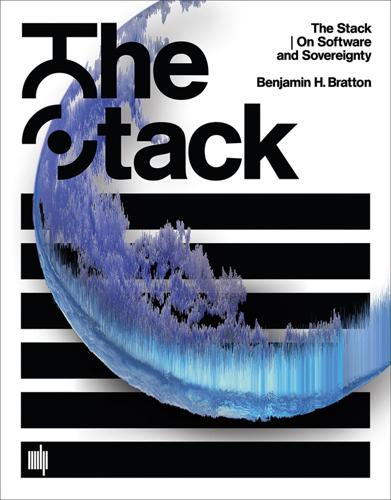
The Stack: On Software and Sovereignty
by
Benjamin H. Bratton
Published 19 Feb 2016
It is also a (perhaps more learned) variation on the predictable tendency to romanticize (both positively and negatively) the presumed depth of faith and conviction of jihadists, radicals, and especially suicide bombers. For this, “we” who are too cynical to believe in anything other than fatal self-interest and the impossibility of something other than capitalist realism are in awe of the resolved single-mindedness of “their” unwavering fanaticism. Their naiveté, so unencumbered with the burden of postmodern nuance and ambivalence, signifies the remaining possibility of actual, ecstatic effervescent experience in the direct midst of global malaise. As Slajov Žižek jokes, “they have faith for us” in perfect inverted symmetry of our own secular disenchantment.

Germany Travel Guide
by
Lonely Planet
Richter, who was born in Dresden and fled to West Germany in the early 1960s, created a major new work in Cologne’s cathedral in 2007 – a vast stained-glass window consisting of 11,500 mesmerising square pieces. Polke, along with Richter and others, relied heavily on pop art and what they dubbed ‘capitalist realism’ – which they used to describe a counterbalance in the West to socialist realism. The influence of the two is as immeasurable as the prices their works command at auctions today. The Museum Ludwig in Cologne is where you can see a good range of Polke’s works. Bulgarian- American artist Christo and his wife Jeanne-Claude were responsible for possibly the best known piece of public art of recent times in Germany.

Germany
by
Andrea Schulte-Peevers
Published 17 Oct 2010
Richter, who was born in Dresden and fled to West Germany in the early 1960s, recently completed a major new work in Cologne’s cathedral Click here – a vast stained-glass window consisting of 11,500 mesmerising square pieces. Polke, along with Richter and others, relied heavily on pop art and what they dubbed ‘capitalist realism’ – which they used to describe a counterbalance in the West to socialist realism. The influence of the two is as immeasurable as the prices their works command at auctions today. The Museum Ludwig in Cologne is where you can see a good range of Polke’s works. * * * For a comprehensive low-down of Germany’s contemporary art scene and events, see www.art-in.de (in German)